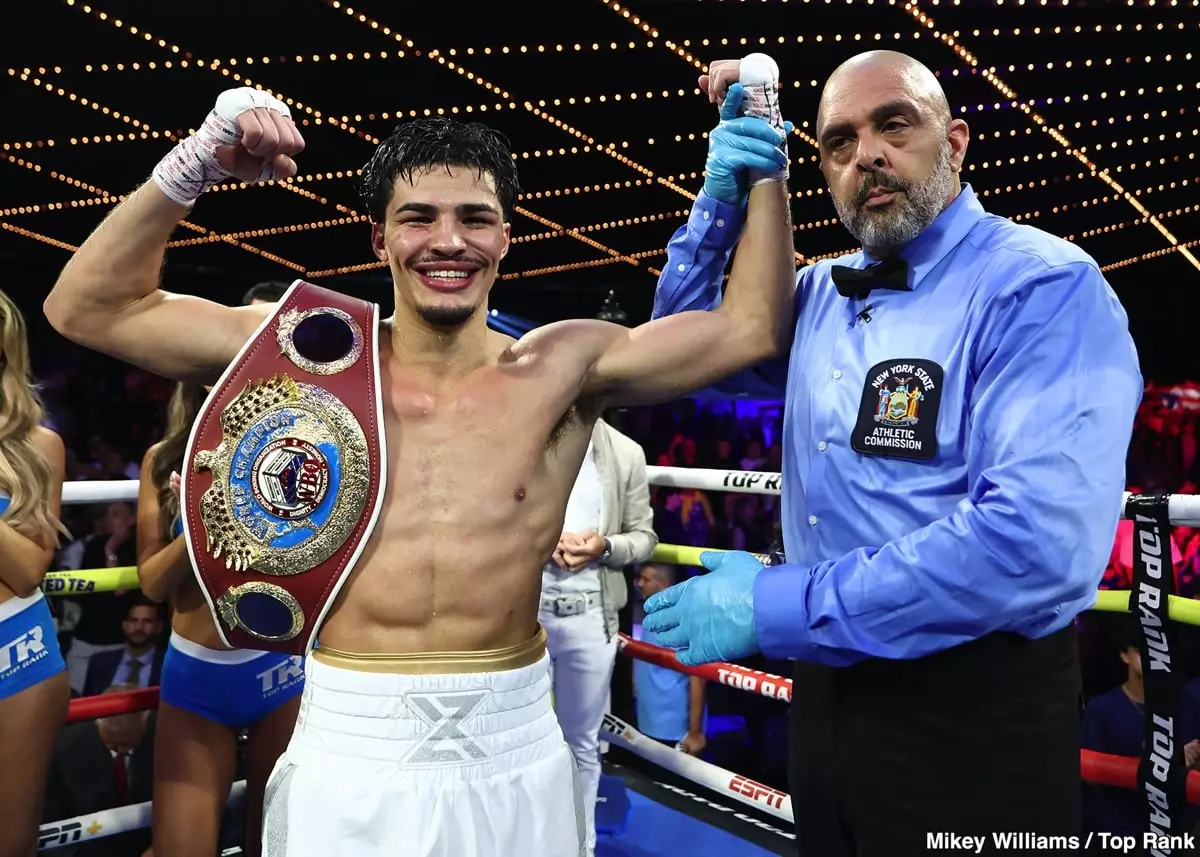In the fiercely competitive world of boxing, titles often serve as symbols of legitimacy and accomplishment, but their true value is frequently clouded by strategic maneuvering and promotional machinations. Xander Zayas, a 22-year-old rising star with an undefeated record, recently captured the WBO junior middleweight title under the guidance of Top Rank. While his victory against Jorge Garcia appears impressive on paper, critics argue that the path to his championship was carefully paved, raising questions about the authenticity of his “champion” status.
Conversely, Vergil Ortiz Jr., a seasoned contender with nearly a decade in the ring, challenges the legitimacy of Zayas’ claim to the title. Ortiz’s dismissive characterization of Zayas as “food” is not merely trash talk but a statement revealing a belief that many seasoned analysts hold: that some fighters are advanced into championship positions not purely based on their skill, but through promotional influence and opportunity manipulation. As Ortiz rightly points out, Zayas’ current record and title do not yet prove his superiority over the historically more established and tested fighters in the division. Claiming a title at this stage can sometimes be more about strategic placement than genuine dominance on the ring.
The Power of Promotion and The Illusion of Opportunity
The disparity in career paths between Ortiz Jr. and Zayas highlights an unsettling truth about boxing: success can be heavily dependent on promotional finesse rather than pure competition. Ortiz, despite boasting nine years of professional experience, has yet to compete for a true world title, largely because his promoters—Golden Boy Promotions—have been less adept at navigating the complex politics of sanctioning bodies and title shots. Meanwhile, Top Rank, with a reputation for strategic positioning, has maneuvered Zayas into a prime spot to secure a belt that, in the eyes of many, might not fully reflect his readiness or skill.
This strategic positioning raises vital questions about the nature of athletic achievement versus calculated career development. Is Zayas truly a champion, or merely a product of advantageous matchmaking? Ortiz implies that, under different circumstances, he would have already faced—and perhaps defeated—the top contenders in the division, thereby establishing his legitimacy. Instead, fighters like Zayas often benefit from a carefully curated journey, one that skirts the harsh reality of competing against the best early in their careers.
The Underlying Power Dynamics Within the Boxing Ecosystem
Behind the rhetoric lies a complex power game involving promoters, sanctioning bodies, and fighters themselves. Promotions wield significant influence—deciding who fights whom and when—making the sport far more political than many fans realize. Ortiz’s pointed comments suggest frustration not with Zayas personally, but with the system that grants certain fighters privileged access to titles based less on merit and more on strategic placements that benefit promotional agendas.
Ortiz’s challenge to Zayas’ claims underscores a deeper, often unspoken truth: the sport’s historical narrative is often shaped by these internal machinations rather than a straightforward meritocracy. As boxing fans, we should scrutinize the titles and accomplishments presented to us, recognizing that narratives of rising stars and undefeated champions frequently serve promotional interests.
In a sport where raw talent and grit are paramount, the reality remains that strategic political positioning often plays an outsized role in who holds belts and titles. The recent exchange between Ortiz Jr. and Zayas is less about personal rivalry and more a reflection of the ongoing power struggle defining modern boxing—one where perception can sometimes overshadow genuine merit.


Leave a Reply